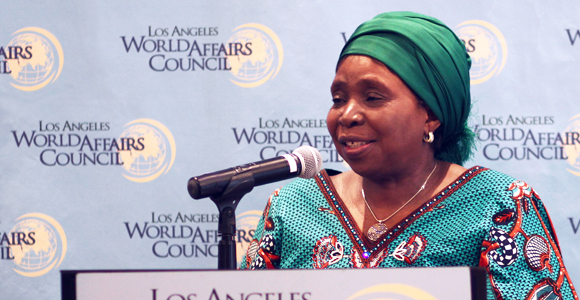
Dr. Nkosazana Dlamini Zuma, Chair of the African Union Commission
“The 21st century will be Africa’s century” said Dr. Nkosazana Dlamini Zuma, Chair of the African Union Commission (AUC). Speaking at a luncheon of the Los Angeles World Affairs Council, Dr. Zuma projected a vision of an Africa that is “prosperous, integrated, people-centered and at peace with itself.”
Dr. Zuma highlighted the key priorities of a 50 year development framework, called “Agenda 2063”. The AUC developed the Agenda following the 50th anniversary celebration of the Organization of African Unity (OAU) in 2013. It prepared the Agenda from the ‘bottom-up’ by consulting with African citizens, civil society and the private sector first and then with governments and policy makers.
The first priority Dr. Zuma identified is the need for Africa to educate its people, by expanding its universities and vocational schools. By 2025 one quarter of the world’s under 25’s will be in Africa. Investing in these young people will not only be good for Africa but also for those other parts of the world with an aging population.
The second priority is agriculture, where despite having abundant land, soil, water and sunshine, Africa is in the “unacceptable situation” of being a net importer of food. “We are examining with all the stakeholders what needs to be done. How do we fast-track irrigation, mechanization, research and infrastructure in agriculture?”
Africa is growing very fast. Seven of the world’s fastest growing economies are in Africa. “But we are growing in an unsustainable way [...]. Africa does not add value toward what it produces. We export our raw materials together with jobs and together with revenues. So we are the biggest job exporters.” To develop industry and add value, the continent needs partners. “We are not asking for charity. Those days are fading now. We want partners who invest and make good returns on their money.”
Infrastructure is another big part of what Africa needs. Africa is big, and due to the lack of infrastructure it feels even bigger. “How can we integrate if we can’t drive to the next capital?” However, Africa does not have to build the same infrastructure that was built during the industrial revolution. It can leapfrog and build first class infrastructure using new technologies. For instance, Africa can get into energy mixes with solar, hydro, wind and geothermal energy in addition to fossil fuel. Furthermore, ”[…] we are going into high speed rail to move our people around and we want to create a single aviation market.”
Equally important as youth, agriculture and infrastructure is the empowerment of women. “If we don’t empower women and we don’t have women in all areas of human endeavor, we don’t think the continent will get to the prosperity it needs, because it will be hobbling on one leg. So, women should be drivers, women and men and young people.”
The development of Africa is also key to ending its armed conflicts, not the other way around, said Dr Zuma. “Our view is that we will have more conflict if we don’t develop the continent, if we don’t invest in our young people,” she said. “We hope in a decade we can close the chapter of armed conflict.”
Turning to the Ebola epidemic that originated in the West African countries of Guinea, Liberia and Sierra Leone, Dr Zuma – herself a medical doctor – pointed out that “what is unique about these three countries is that they are fragile states even before Ebola [...]. They came out of conflicts. Their health services are very weak. It was impossible for them to mount an appropriate and effective response at the beginning to be able to contain the epidemic.” It is important now to help these countries financially and logistically and to bring treatment centers to the villages. As the world is building these treatment centers, the Organization of African Unity (OAU) is mobilizing health workers from other African countries who have dealt with Ebola before to staff these centers.
But despite the challenges facing Africa, Dr. Zuma presented a refreshingly upbeat assessment of Africa’s future for the 21st century – and the possibilities for productive partnerships with outsiders who are willing to invest.
